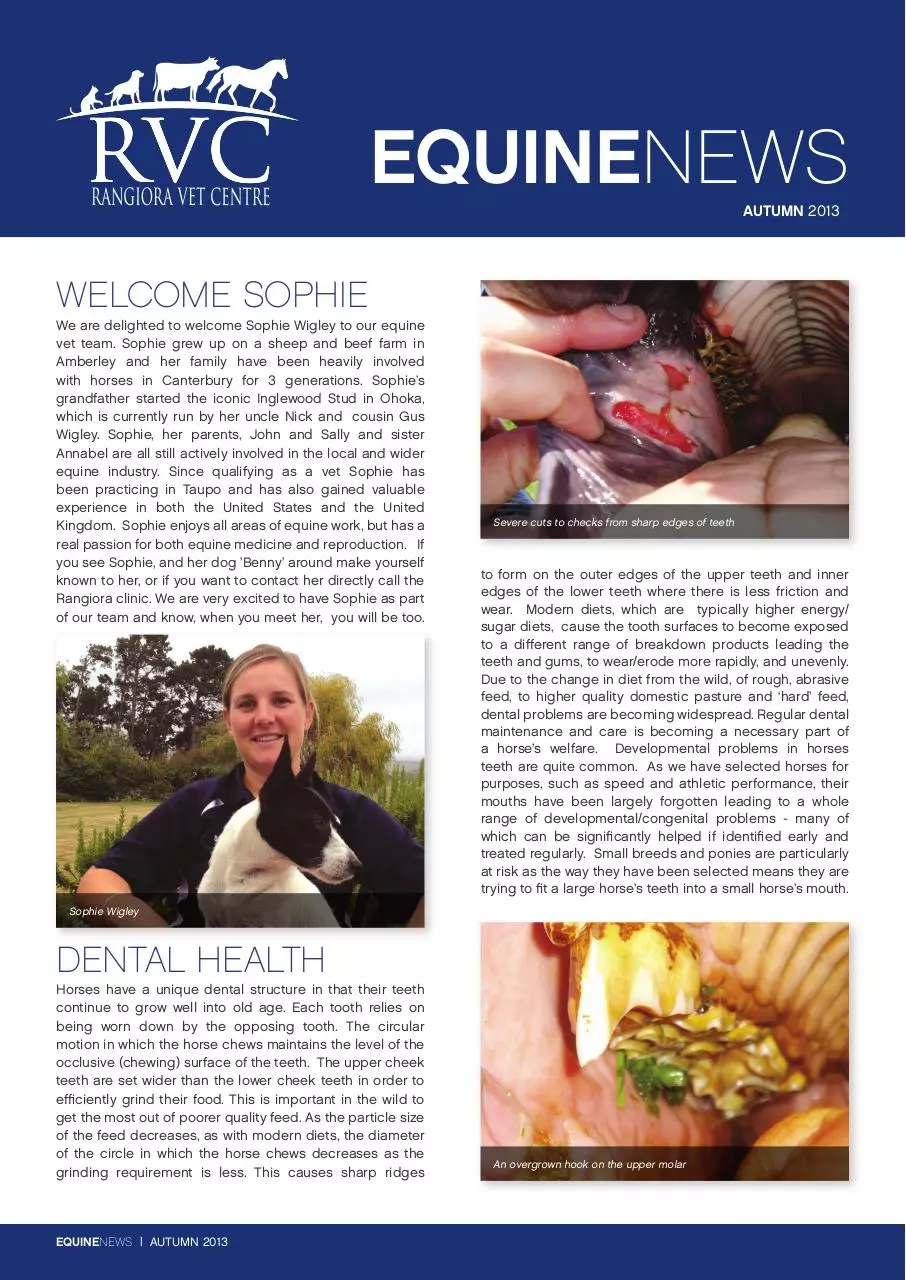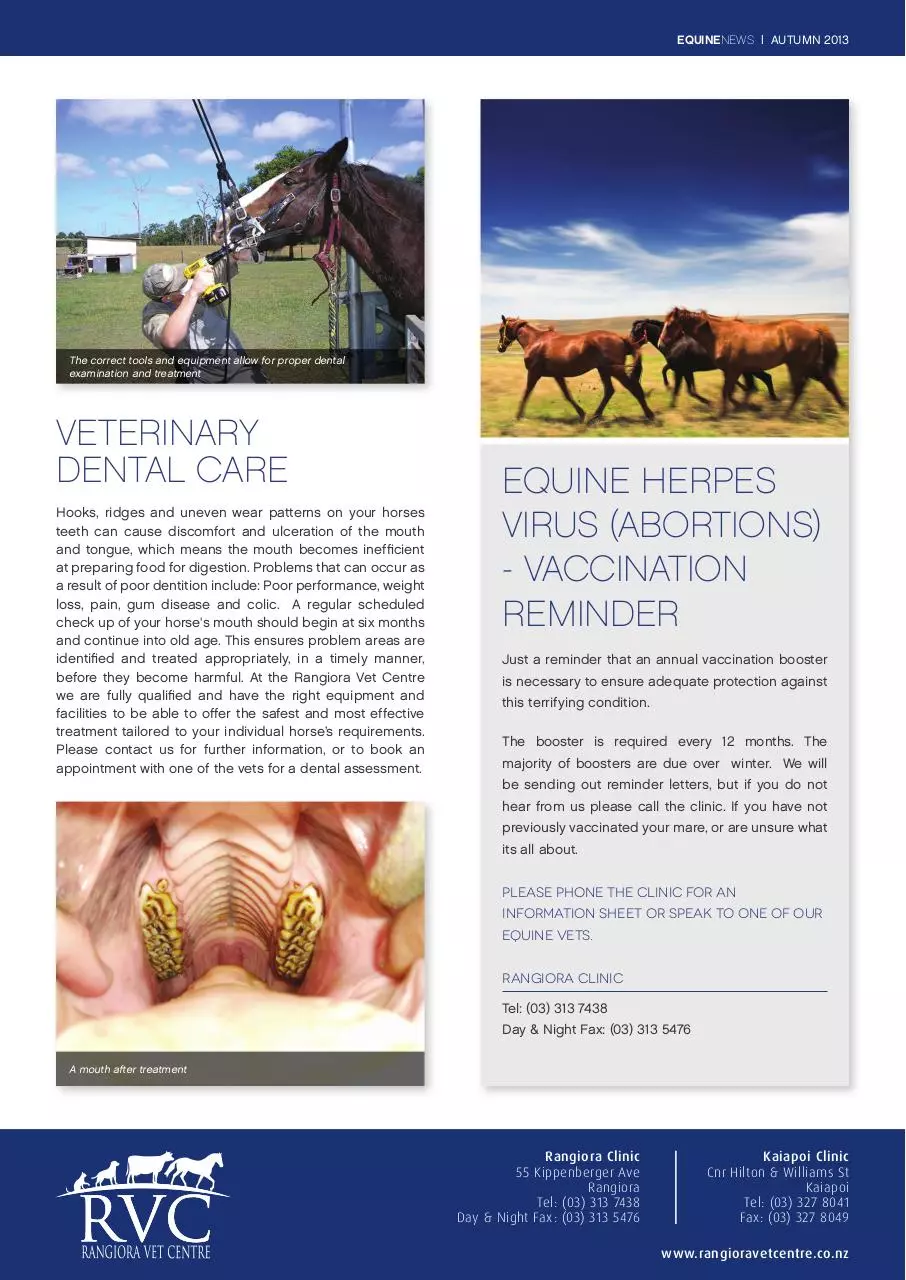EQUINE NEWSLETTER 5.13 (PDF)
File information
This PDF 1.4 document has been generated by Adobe InDesign CS5.5 (7.5.3) / Adobe PDF Library 9.9, and has been sent on pdf-archive.com on 27/05/2013 at 04:32, from IP address 219.89.x.x.
The current document download page has been viewed 754 times.
File size: 2.37 MB (2 pages).
Privacy: public file


File preview
EQUINENEWS
AUTUMN 2013
WELCOME SOPHIE
We are delighted to welcome Sophie Wigley to our equine
vet team. Sophie grew up on a sheep and beef farm in
Amberley and her family have been heavily involved
with horses in Canterbury for 3 generations. Sophie’s
grandfather started the iconic Inglewood Stud in Ohoka,
which is currently run by her uncle Nick and cousin Gus
Wigley. Sophie, her parents, John and Sally and sister
Annabel are all still actively involved in the local and wider
equine industry. Since qualifying as a vet Sophie has
been practicing in Taupo and has also gained valuable
experience in both the United States and the United
Kingdom. Sophie enjoys all areas of equine work, but has a
real passion for both equine medicine and reproduction. If
you see Sophie, and her dog ’Benny’ around make yourself
known to her, or if you want to contact her directly call the
Rangiora clinic. We are very excited to have Sophie as part
of our team and know, when you meet her, you will be too.
Severe cuts to checks from sharp edges of teeth
to form on the outer edges of the upper teeth and inner
edges of the lower teeth where there is less friction and
wear. Modern diets, which are typically higher energy/
sugar diets, cause the tooth surfaces to become exposed
to a different range of breakdown products leading the
teeth and gums, to wear/erode more rapidly, and unevenly.
Due to the change in diet from the wild, of rough, abrasive
feed, to higher quality domestic pasture and ‘hard’ feed,
dental problems are becoming widespread. Regular dental
maintenance and care is becoming a necessary part of
a horse’s welfare. Developmental problems in horses
teeth are quite common. As we have selected horses for
purposes, such as speed and athletic performance, their
mouths have been largely forgotten leading to a whole
range of developmental/congenital problems - many of
which can be significantly helped if identified early and
treated regularly. Small breeds and ponies are particularly
at risk as the way they have been selected means they are
trying to fit a large horse’s teeth into a small horse’s mouth.
Sophie Wigley
DENTAL HEALTH
Horses have a unique dental structure in that their teeth
continue to grow well into old age. Each tooth relies on
being worn down by the opposing tooth. The circular
motion in which the horse chews maintains the level of the
occlusive (chewing) surface of the teeth. The upper cheek
teeth are set wider than the lower cheek teeth in order to
efficiently grind their food. This is important in the wild to
get the most out of poorer quality feed. As the particle size
of the feed decreases, as with modern diets, the diameter
of the circle in which the horse chews decreases as the
grinding requirement is less. This causes sharp ridges
EQUINENEWS | AUTUMN 2013
An overgrown hook on the upper molar
EQUINENEWS | AUTUMN 2013
The correct tools and equipment allow for proper dental
examination and treatment
VETERINARY
DENTAL CARE
Hooks, ridges and uneven wear patterns on your horses
teeth can cause discomfort and ulceration of the mouth
and tongue, which means the mouth becomes inefficient
at preparing food for digestion. Problems that can occur as
a result of poor dentition include: Poor performance, weight
loss, pain, gum disease and colic. A regular scheduled
check up of your horse's mouth should begin at six months
and continue into old age. This ensures problem areas are
identified and treated appropriately, in a timely manner,
before they become harmful. At the Rangiora Vet Centre
we are fully qualified and have the right equipment and
facilities to be able to offer the safest and most effective
treatment tailored to your individual horse’s requirements.
Please contact us for further information, or to book an
appointment with one of the vets for a dental assessment.
EQUINE HERPES
VIRUS (ABORTIONS)
- VACCINATION
REMINDER
Just a reminder that an annual vaccination booster
is necessary to ensure adequate protection against
this terrifying condition.
The booster is required every 12 months. The
majority of boosters are due over winter. We will
be sending out reminder letters, but if you do not
hear from us please call the clinic. If you have not
previously vaccinated your mare, or are unsure what
its all about.
Please phone the clinic for an
information sheet or speak to one of our
equine vets.
Rangiora Clinic
Tel: (03) 313 7438
Day & Night Fax: (03) 313 5476
A mouth after treatment
Rangiora Clinic
55 Kippenberger Ave
Rangiora
Tel: (03) 313 7438
Day & Night Fax: (03) 313 5476
Kaiapoi Clinic
Cnr Hilton & Williams St
Kaiapoi
Tel: (03) 327 8041
Fax: (03) 327 8049
www.rangioravetcentre.co.nz
Download EQUINE NEWSLETTER 5.13
EQUINE NEWSLETTER 5.13.pdf (PDF, 2.37 MB)
Download PDF
Share this file on social networks
Link to this page
Permanent link
Use the permanent link to the download page to share your document on Facebook, Twitter, LinkedIn, or directly with a contact by e-Mail, Messenger, Whatsapp, Line..
Short link
Use the short link to share your document on Twitter or by text message (SMS)
HTML Code
Copy the following HTML code to share your document on a Website or Blog
QR Code to this page

This file has been shared publicly by a user of PDF Archive.
Document ID: 0000106817.